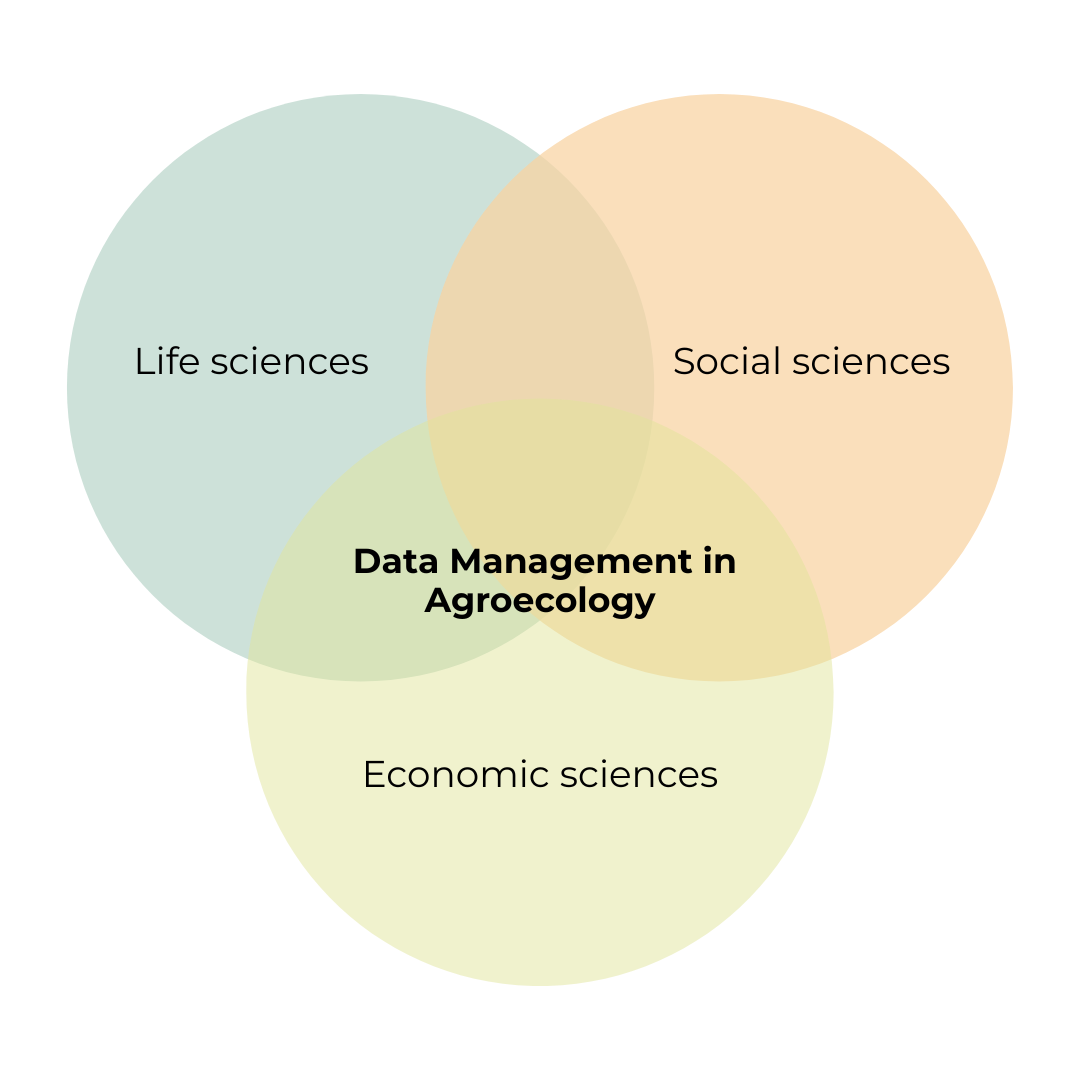
Discipline-Specific Data Management in Agroecology
Agroecology is a highly interdisciplinary field that integrates knowledge from various scientific domains to promote sustainable agricultural systems. This page offers a structured overview by organizing the relevant research fields into three main domains: Life Sciences, Social Sciences, and Economic Sciences. Each field contributes uniquely to understanding the complex interactions within agro-ecosystems, addressing both ecological and socio-economic dimensions of sustainability.
This section serves as a gateway to key data management resources and networks relevant to each research field. By categorizing the research fields, the portal facilitates navigation and access to specialized resources, supporting researchers in exploring the complex interactions within agro-ecosystems.
Research Data Management resources
Life sciences in agroecology focus on the biological and ecological interactions within agricultural systems. These fields contribute to understanding biodiversity, ecosystem services, and the genetic and phenotypic traits of crops and soil organisms.
Recommended general resources for effective research data management are:
- FAIRCookBook: Practical step-by-step recipes for implementing FAIR data practices in life sciences, including metadata annotation and data licensing.
- FAIRsharing: A curated registry of data standards, repositories, and policies to facilitate FAIR data practices in agro-ecological research.
- AgroPortal: Provides controlled vocabularies and ontologies for consistent data annotation and semantic interoperability.
In addition to these general RDM resources, life science research in agro-ecology involves various advanced technologies for studying the biological interactions and traits within agricultural systems. These include (but are not limited to):
- Proteomics:
What: Study of the structure, function, and interactions of the complete set of proteins (the proteome) expressed by a cell, tissue, or organism.
RDM resources: [https://rdmkit.elixir-europe.org/proteomics ]
- Genomics:
What: Genetic sequencing and analysis of crops, soil microbes, and biodiversity.
RDM resources: [https://rdmkit.elixir-europe.org/plant_genomics_assembly ]
- Phenomics:
What: Analysis of phenotypic traits and their interactions with environmental factors.
RDM resources: [https://rdmkit.elixir-europe.org/plant_phenomics_assembly ]
- Biodiversity and Ecology:
What: Study of species diversity, ecosystem dynamics, and ecological resilience.
RDM resources coming soon
- Soil Science and Microbiology:
What: Exploration of soil health, nutrient cycling, and microbial interactions.
RDM resources coming soon
Social sciences in agroecology explore the human dimensions of agricultural systems, including cultural practices, community interactions, and policy frameworks. These fields contribute to understanding the social and behavioral drivers of sustainable agricultural transitions. Key data management resources include:
- CESSDA Data Management Expert Guide (DMEG) offers a comprehensive guide offering best practices and practical advice on research data management throughout the data lifecycle, specifically tailored for the social sciences.
Data Management Expert Guide
- Data Management for the Social Sciences Guide: UCLA offers a detailed guide covering best practices throughout the data lifecycle, including data collection, organization, and sharing.
UCLA Library Guides
- Qualitative Data Repository (QDR): Hosted by Syracuse University, QDR specializes in managing qualitative data, addressing unique challenges in archiving, sharing, and citation within the social sciences.
qdr.syr.edu
- UK Data Service: This comprehensive resource provides access to a vast collection of social science data, along with guidance on data management and curation.
- Data Documentation Initiative (DDI): An international standard for describing surveys and other social science data, facilitating effective data sharing and reuse.
- Grid-Enabled Measures (GEM): An NIH initiative providing a collaborative platform for researchers to exchange standardized behavioral measures and data, promoting harmonization and interoperability.
Economic sciences in agroecology examine the financial and market aspects of sustainable agriculture, including economic viability, market dynamics, and value chains. Key data management resources include:
- Toolkit for Economic Assessment: The U.S. Department of Agriculture (USDA) offers "The Economics of Local Food Systems: A Toolkit to Guide Community Discussions, Assessments, and Choices." This resource aids communities in evaluating the economic impacts of local food systems and provides guidance on data collection and analysis.
- Data Equity Framework: The Food Systems Data Equity Framework discusses the importance of clarity in data analysis motivations and managing the complexity inherent in food systems. It provides guidance on ensuring equitable data practices in food systems research.
- Guiding Principles for Sustainable Value Chains: The Food and Agriculture Organization (FAO) has published "Developing Sustainable Food Value Chains: Guiding Principles," which outlines a framework and principles for sustainable food value chain development. This resource emphasizes the importance of data in understanding and enhancing value chain dynamics.
- Improving Traceability: A report by the World Economic Forum titled "Improving Traceability in Food Value Chains through Technology Innovations" highlights how technological advancements can enhance traceability. Improved traceability supports better data management and market transparency.